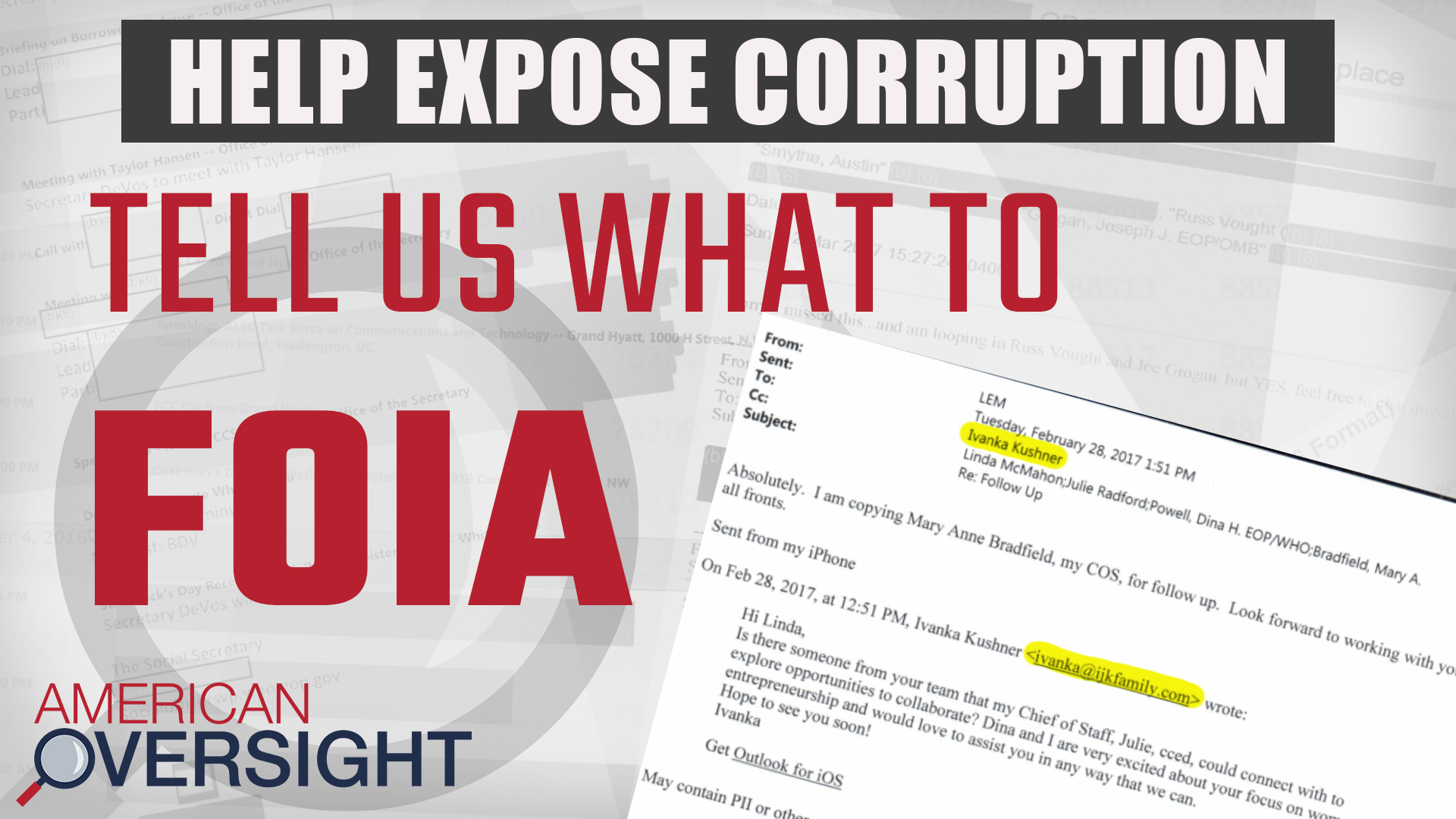Tell Us What to FOIA
Do you know about emails or other files that show misconduct or corruption? Just tell us where they are — we'll use FOIA to force their release.

Every day there’s another story: Trump administration officials abusing their offices, misdirecting government resources, or tipping the scales in favor of particular industries at the expense of the American people. And then there’s President Trump and his family — from keeping the Old Post Office Tower at the Trump Hotel open despite the government shutdown and using personal email for government business to denying hurricane relief funds to Puerto Rico.
You can help American Oversight expose the truth. We aren’t asking you to leak documents or disclose confidential information. But if you know of emails or other files that show misconduct or corruption — just tell us where they are, and we can use the Freedom of Information Act to force their release.
There are several key ways you can help us target our FOIA requests to uncover corruption or misconduct. To which agency or department should we send the request? What type of document should we be asking for (emails, memos, calendars, etc.)? Are there any keywords that would appear in the records that we can use in our request? How about specific people or offices likely to be custodians of the documents, such as email correspondents? Is there a date or date range we should specify? The more detail you can share to help us narrow and target a request, the more likely it is to be successful.
For example, if you knew that a certain EPA administrator had paid tens of thousands of dollars to install a secret phone booth in his office, you could tell us to FOIA the EPA contracting office for “Order for Supplies or Services” forms containing the words “privacy” or “acoustical” dated August 2017.
American Oversight has been investigating misconduct, conflicts of interest, and corruption in the Trump administration since 2017, and we’ve used FOIA to uncover details about former EPA Administrator Scott Pruitt’s industry-heavy calendar and secret phone booth, Ivanka Trump’s extensive use of personal email, Education Secretary Betsy DeVos’ vacation schedule, HUD Secretary Ben Carson’s role in selecting a pricy dining set, and dozens of unqualified political appointees across the government.
How to Contact Us
Signal or another secure messaging app
Signal is a free, end-to-end encrypted messaging app, which allows you to communicate securely with American Oversight via text and voice. No metadata is retained by Signal. You can download Signal from your phone’s app store.
Our Signal phone number is (202) 258-5815.
U.S. Mail
The most secure, anonymous way to share information with American Oversight is via the U.S. Postal Service. Our mailing address is:
American Oversight
1030 15th St. NW Suite B255
Washington, DC 20005
Email or Phone
You can also email us directly at info@americanoversight.org or call us at 202-869-5246. These are the least secure methods to contact us, so if you are at all concerned about security, we recommend using one of the methods above.
Anonymity and Confidentiality
American Oversight understands the courage it takes for someone to report corruption and ensure accountability. Out of respect for your courage, we want to be clear about the risks, and the steps you and American Oversight can take to mitigate them.
American Oversight takes your confidentiality seriously. We will respect it and take steps to protect it, but we cannot give you a 100 percent guarantee. No system of communication is completely secure and no organization can resist every effort to discover sources. Here is what we can guarantee: We will make every effort to protect who you are and what you tell us.
There are steps you can take to protect yourself. If you are concerned about protecting your identity, the best way to contact us is by mail: Send us a letter or drop documents in the mail. We recommend using a standalone mailbox instead of a post office.
But total anonymity has its costs, too. For us to do the most good, it is often helpful to know who you are and to have a way to contact you. Today, encrypted messaging apps like Signal and WhatsApp provide a secure way to communicate with less risk of compromise. We recommend using these tools if you are concerned about security.
When contacting us electronically, do not use your work computer or equipment. Also, consider creating a new email address to communicate with us and delete communications records from any system you use.